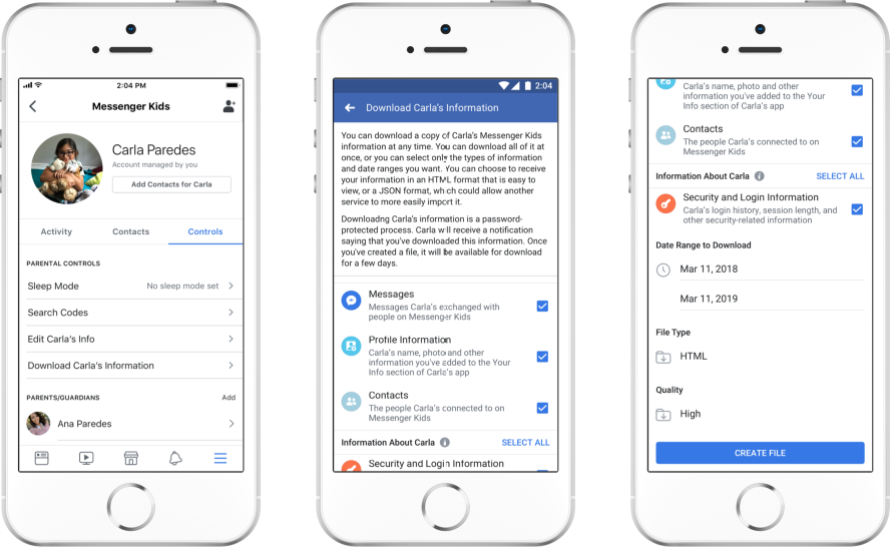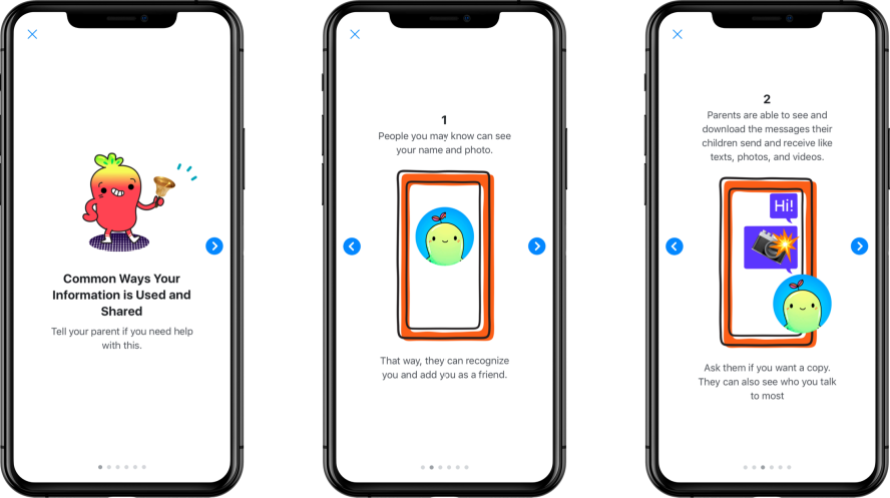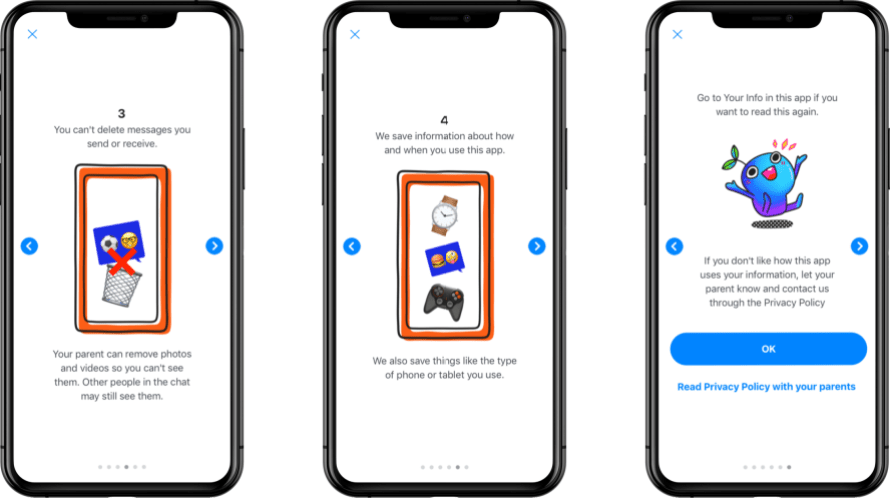For the latest on how to use Messenger Kids, visit our Help Center.
We launched Messenger Kids in 2017 after meeting with thousands of parents, parenting organizations, child safety advocates and child development experts about the need for a messaging app that lets kids have fun connecting with friends and family while giving parents control over the experience. With two out of three parents wishing they had more control over their kids’ online experiences,* we’ve continued our dialogue with parents and experts around the world to ensure we’re providing a messaging app that works for families. Today, we’re announcing additional tools and features for parents to manage their child’s experience in Messenger Kids, and updating our privacy policy.
Parents can access these new features in the Messenger Kids Parent Dashboard in the Facebook iOS and Android apps to better understand how their child is using the app.
“Facebook has done a good job of balancing features that both deliver the right information to keep parents in the loop about their child’s use of Messenger Kids, while also allowing children to have fun and learn digital literacy skills. It’s important to give parents the power to manage their child’s experience, like seeing what images and videos their children are sending and receiving. It’s great to see Facebook providing additional information without overwhelming parents with too much detail.”
– Larry Magid, Internet safety advocate and CEO of ConnectSafely.org (ConnectSafely is a nonprofit internet safety organization that receives support from Facebook and other tech companies. ConnectSafely also serves as a member of Facebook’s Safety Advisory Board, and receives an honorarium in appreciation of their time and expertise.) (Updated on February 4, 2020 at 9:48am PT to clarify organization’s role.)
New Parent Dashboard features include:
- Recent Contacts and Chat History: See who your child is chatting with, whether they are video chatting or sending messages and how frequently those conversations happened over the past 30 days.
- Log of Images in Chats: See the most recent photos and videos your child has sent and received in their inbox. If you believe an image or video is not appropriate for your child, you can remove it from your child’s message thread and report it.
- Reported and Blocked Contacts History: Access a list of the reporting and blocking actions your child has taken in the app. You’ll see a list of the contacts your child has blocked and/or unblocked, if they have reported any messages as well as any contacts they’ve reported and the reason for their action. Parents will continue to be notified via Messenger if their child blocks or reports someone.
- Remote Device Logout: See all devices where your child is logged in to Messenger Kids and log out of the app on any device through the Parent Dashboard. (Note: This feature is not meant to control when kids have access to the app – try Sleep Mode for that.)
- Download Your Child’s Information: Request a copy of your child’s Messenger Kids information, similar to how you can download your own information within the Facebook app. The download will include a list of your child’s contacts as well as the messages, images and videos they have sent and received. Your child will be notified through the Messenger Kids app when you request this information.
You can access the Parent Dashboard and all these new features by tapping the shortcut menu in the Facebook app and scrolling to the Messenger Kids icon. If you have multiple kids using Messenger Kids, select the name of the child whose account you’d like to manage to access their specific dashboard.
A New Way to Block
We’ve updated the way kids block contacts in Messenger Kids to give them a simpler way to manage who they interact with. Kids can now unblock a blocked contact on their own if they want to restart one-on-one chats with them, and chats with blocked contacts will stay in the Messenger Kids inbox so parents can view them if they’d like. Kids and their blocked contacts will remain visible to one another and will stay in shared group chats, but will not be able to message each other individually. Kids will also receive a warning if they return to, or are added to, a group chat that includes a blocked contact, and can leave group chats at any time.
Parents remain in control of who their child is connected to in Messenger Kids and can remove people from their child’s contact list at any time. To get more information on how blocking works in Messenger Kids, visit the Help Center.
Helping Kids Understand How Their Information Is Used
As kids start using technology, we think it’s important to help them understand how their information is used and shared. That’s why we developed an in-app activity that uses kid-appropriate language to educate kids on the types of information people can see about them. For example, we inform kids that people they know may see their name and photo, that parents can see and download their messaging content and that they are not able to delete any messages they send or receive.
Like any app, Messenger Kids requires data to operate basic functions, such as to show previous messages in a conversation, put frequent contacts at the top of the contact list and show the devices used to log in to a child’s Messenger Kids account.
Privacy Policy Update
When families choose Messenger Kids, parents trust us to protect their children’s data and privacy, and we take that responsibility seriously. We’ve updated the Messenger Kids privacy policy to include additional information about our data collection, use, sharing, retention and deletion practices.
The updated policy explains our privacy practices with regard to the new features and improvements we’ve added to Messenger Kids, such as new controls and visibility in the Parent Dashboard.
In addition to the new features we’re announcing today, the updated privacy policy describes some things we expect to roll out later. For example, we plan to enable Messenger Kids users to provide feedback directly in the app when something isn’t working and run user surveys to help improve product features. Parents have also told us they want more options when they determine their child is ready for more control and responsibility, so the updated policy describes some forthcoming options for parents on how their child can use the app. We will continue to consult with parents and experts, and we’ll share more about those features when they launch.
There are a number of things that aren’t changing with the new features and updated privacy policy. For example, we haven’t changed our practices with regard to sharing information with third parties. The privacy policy continues to make it clear – now with even greater transparency – that we share information with service providers for the purpose of operating the Messenger Kids service. We require them to adhere to strict data confidentiality and security obligations, and work with them on things like reviewing and addressing reported issues from our users. (Updated on December 2, 2021 at 5:00PM PT to reflect specific language in the Messenger Kids Privacy Policy.)
We don’t use children’s data from Messenger Kids for advertising. There continue to be no ads in Messenger Kids and no in-app purchases. And as the updated privacy policy reaffirms, we don’t sell any of your or your child’s information to anyone, and we never will.
These updates are part of our ongoing efforts to provide more transparency and help people better understand how our services work. Parents will have 90 days to review and accept the new privacy policy and we strongly encourage them to review the updates with their kids. The updated privacy policy can be found here.
For more information about Messenger Kids, please visit MessengerKids.com.
*This survey was commissioned by Facebook and conducted in North America by IPSOS, December 2019.






